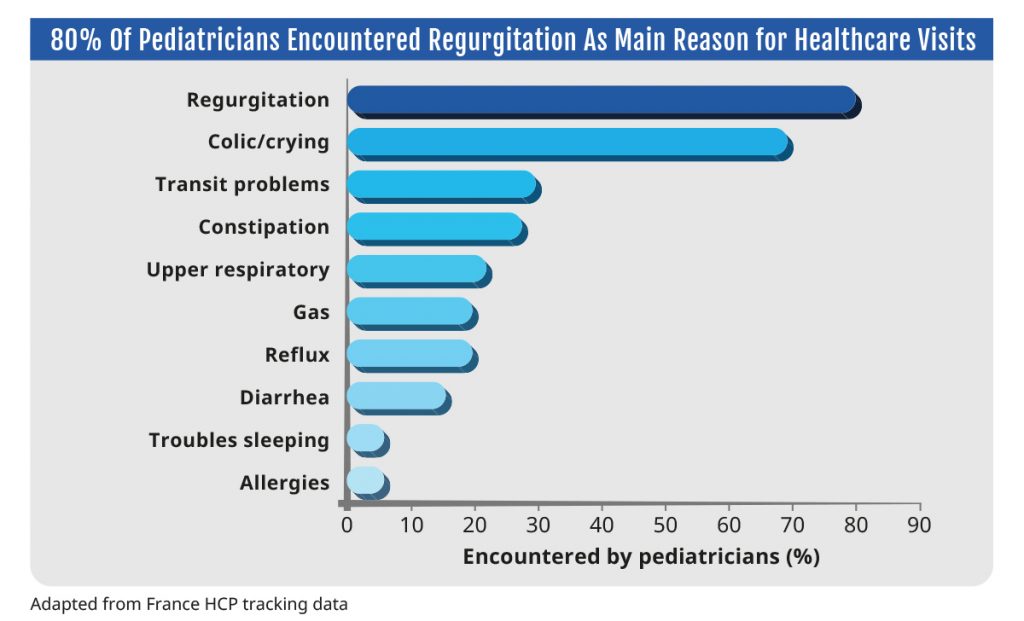When a baby or infant is in distress due to a functional gastrointestinal disorder (FGID) it can affect the whole family and lead to increased stress and medical expenditure. Healthcare professionals are key when it comes to managing expectations and offering the right medical advice.
Several studies have demonstrated the negative impact of infant colic, infant regurgitation and constipation, not only on the infant, but on the whole family due to the anxiety and distress parents feel when a small infant has symptoms related to FGIDs1-3. This impact has been shown to be both short- and long-term2-7. For example, it has been demonstrated that the social interaction between both parents and the child – particularly between fathers and infants – was less optimal in families with infants that cried excessively8. Additionally, there is evidence that infant FGIDs are associated with gastrointestinal symptoms by the time the child reaches its teens9.
Impact of FGIDs
In terms of healthcare provision, one direct and highly important effect on families is on expenditure due to the high number of doctors’ appointments. In the US, >1 million visits for infant regurgitation are recorded per year, while acute constipation in infants under one is the leading reason for emergency department visits. Average costs have been calculated at $2,306 (€2.1K) per patient in the US10, while figures from England point to sleeping and crying problems in babies (under three months) costing the health service at least €80M ($88M) per year11.

Healthcare professionals are key
Healthcare professionals play a crucial role when it comes to providing parents with information and support to help them understand and manage an infant’s gastrointestinal symptoms. For this reason, healthcare visits are not only centered around the child’s symptom(s), but also look at the family’s fears. The physician must both make a diagnosis and recognize the impact of the symptoms on the family’s emotions and ability to function.
Leading pediatric gastroenterology and nutrition groups have published guidelines and expert consensus for the management of infant regurgitation, colic and constipation. In these groups, parental education and reassurance, together with nutritional advice, are widely accepted as first-intent management for common gastrointestinal problems12. If a child is being partly or exclusively breastfed, the mother should be encouraged to continue throughout the FGID phase, however difficult this may initially appear. It was also concluded that pharmacological therapy was often not effective and could produce adverse effects12.
References
- Vandenplas Y, et al. Prevalence and Health Outcomes of Functional Gastrointestinal Symptoms in Infants from Birth to 12 Months of Age. J Pediatr Gastroenterol Nutr. 2015;61:531-7
- Rautava P et al. Infantile colic: child and family three years later. Pediatrics. 1995;96:43-47
- Akman I, et al. Mothers’ postpartum psychological adjustment and infantile colic. Arch Dis Child. 2006;91:417-419
- Howard CR, et al. Parental responses to infant crying and colic: the effect on breastfeeding duration. Breastfeeding Med. 2006;1:146-155
- Miller-Loncar C, et al. Infant colic and feeding difficulties. Arch Dis Child. 2004;89:908-912
- Forsyth BW & Canny PF. Perceptions of vulnerability 3 1/2 years after problems of feeding and crying behavior in early infancy. Pediatrics. 1991;88:757-763
- Indrio F, et al. Infantile colic, regurgitation, and constipation: an early traumatic insult in the development of functional gastrointestinal disorders in children? Eur J Pediatr.2015;174:841-842
- Raiha H, et al. Excessively crying infant in the family: mother-infant, father-infant and mother-father interaction. Child Care Health Dev. 2002;28:419-29
- Partty A, et al. Infant distress and development of functional gastrointestinal disorders in childhood: is there a connection? JAMA Pediatr. 2013;167:977-978
- Sommers T, et al. Emergency department burden of constipation in the United States from 2006 to 2011. Am J Gastroenterol. 2015;110:572-79
- Morris S, et al. Economic evaluation of strategies for managing crying and sleeping problems. Arch Dis Child. 2001;84:15-19
- Benninga MA, et al. Childhood functional gastrointestinal disorders: neonate/toddler. Gastroenterology. 2016;150:1443-57
BA19-485
